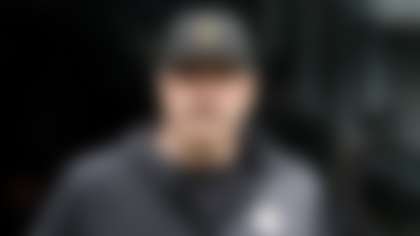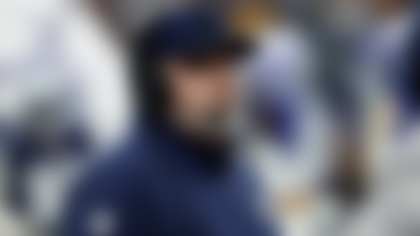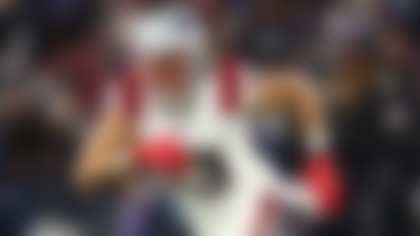ORCHARD PARK, N.Y. -- The reminders came from about 1,300 miles southwest of the winter wonderland known as Ralph Wilson Stadium.
They came just under six minutes into the New England Patriots' game at Houston. They came when NFL reception leader Wes Welker, one of the primary reasons the Patriots are champions of the AFC East and one of the main reasons they'd have a chance to advance beyond the wild-card round, caught a 12-yard pass ... and his knee buckled ... and he left the field on a cart with an injury that is believed severe enough to end his season, if not his career.
The reminders were these: When you put any player on the field in any game, you risk losing him to an injury. When the player is a starter and an essential part of your success, and the outcome of the game has little or no impact on your team's playoff positioning, you take that risk unnecessarily.
No second-guessing Belichick
Solomon Wilcots says three Super Bowl titles and countless memories of conquest have earned Bill Belichick the right to go against the logic routinely used by the Colts. **More ...**
And you set yourself up for making a monumental error in judgment. A blunder of colossal proportions. The kind of thing that will be talked about for years if, without that player in the lineup, you lose in the postseason.
How bad do the Indianapolis Colts look now for yanking Peyton Manning and other starters three quarters into last week's game -- which had no bearing on their playoff status -- against the New York Jets?
How bad do they look for having Manning only play a little more than a quarter of Sunday's game against the Buffalo Bills?
For the perfection obsessed, the grumbling no doubt will continue. Without Manning, the Colts' chances for an unbeaten season evaporated the moment Curtis Painter met the Jets defense. The 30-7 loss to the lowly Bills, played in bitter cold and a steady snowfall, was yet another messy Painter job for the sake of preserving the health of the quarterback who really matters.
But it's impossible to look at Welker's ravaged knee without feeling that what the Colts did in the final two weeks of the season just might have made a whole lot of sense.
So they don't go 16-0. So what? Manning is healthy. Reggie Wayne is healthy. Dallas Clark is healthy.
"It was a tough decision for the coaches and for the management to make, and a lot of people frowned upon it, but (Welker's injury) is exactly the situation that you want to try to avoid as much as you can," Clark said. "You cannot control injuries. You can't control what happens on the field, and that's why you want to protect guys as much as possible.
"And if you can put yourself in a situation where you can protect them by not playing them, you want to do that because it just takes one play and you never know when it's going to happen and how it's going to happen."
Protecting players for the postseason has always been the top priority since the Colts became a regular contender. This season was never going to be any different.
Although the Colts didn't actually assume protection mode until the Jets game, they were very much in that frame of mind after beating Denver in Week 14 to lock up the No. 1 seed in the AFC playoffs. Assured that a two-game path to Super Bowl XLIV would run through Lucas Oil Stadium, their management and coaches spoke extensively about how much to play Manning in the next game, at Jacksonville. With veteran reserve quarterback Jim Sorgi out for the season with a shoulder injury and no other experienced backup option available, playing Manning was especially dangerous.
The Colts' brain trust finally concluded that their starters were best equipped to handle the short preparation for the Thursday night game. They also were mindful of the fact they'd be playing before an NFL Network audience, and recognized that putting on a good show for the national audience was good business for the league. Manning played the entire way and the Colts improved to 14-0.
But Bill Polian, the Colts' president, had no intention of allowing Manning to go the entire way against the Jets' blitz-happy defense. He saw him playing a half at the most. Jim Caldwell, the Colts' coach, decided to let him play into the third quarter. To the Lucas Oil Stadium crowd, that appeared to be a sign that the Colts perhaps did want to take a shot at perfection.
When Manning was pulled, the crowd booed. Loudly. And the critics criticized. Loudly. Polian and the rest of the Colts' decision-makers were blasted, largely in the Indianapolis media, for cheating the fans. If it had been solely up to Polian, the fans would have seen even less of Manning in the Jets' game.
"There is no (quality) backup, so why would you (expose Manning for a full game) in a high-risk situation against the Jets who are blitzing like hell?" Polian said. "The fact that Jim left him in as long as he did was a bit surprising to me."
The organizational intent, he said, was to treat the Jets game "like a third preseason game," when starters traditionally play a solid half or so as a tune-up for the regular season, and the Bills' game "like a fourth preseason game," when starters appear for a couple of series. Manning played three against Buffalo, throwing an interception to end the first and leading a touchdown drive on the second. One play into the second quarter, he walked to the sideline, pulled on a blue ski hat and watched.
All sorts of opinions have been voiced about the ills of the Colts' decision to punt on perfection. Besides the notion that they somehow cheated their fans, there has been discussion about the damage they've done to the integrity of the game.
By "allowing" the Jets to win, they put a team that otherwise wouldn't be worthy of a playoff spot in a position to capture one Sunday night against the Cincinnati Bengals. Commissioner Roger Goodell is concerned enough about the integrity issue that he plans to bring it up to the NFL's Competition Committee, of which Polian is a prominent member. That should be an interesting conversation.
Among other points that pundits have made in the past several days are these:
» The Colts have put greater pressure on themselves to reach the Super Bowl than the last team that went 16-0, the 2007 Patriots. If they lose either playoff game, then their approach to the final two games will be viewed as a failure. It will not only be second-guessed for being something that shortchanged a loyal fan base, it will also be seen as a cause for rustiness.
» If the Colts go on to win the Super Bowl, giving them a 17-2 record, they'll always be left to lament that they could have been 19-0 and joined the 1972 Miami Dolphins as the only unbeaten league champions.
"Nobody remembers what you did in the regular season," Polian said. "They know where you're seeded, and we happen to be seeded No. 1. But they don't care about anything else."
Said defensive end Raheem Brock, "It doesn't matter what your record is. The only outcome is who wins the Super Bowl. If you barely make it to the playoffs or you're undefeated, it's who won the Super Bowl that year. That's it."
Clark has heard all of the conjecture regarding the ramifications of the Colts' seemingly self-inflicted 14-2 finish to the regular season. He reacts to it with a shrug.
"Bottom line is we haven't done anything," Clark said. "We've had the No. 1 seed and got beat out by Pittsburgh at home. We've come from wild card to win the Super Bowl. Nothing is guaranteed. You still have to go out there and you still have to play the game."
That a team tends to play better with their key starters healthy is something the Colts are banking on as their ticket to a second Super Bowl crown since 2006. It's also something the Patriots can only wish they could do.



